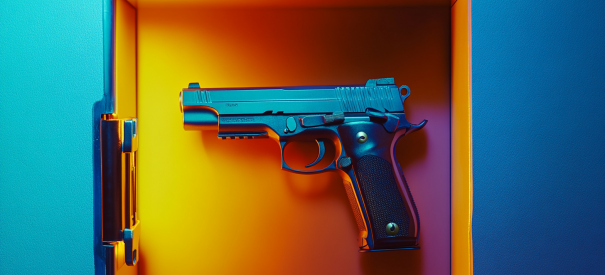
If you want to start an FFL business manufacturing, selling, or importing firearms, you’ll need a Federal Firearms License (FFL). There are different types of FFLs that have different rules that apply to them. For example, a Home-Based Federal Firearms License is held by someone looking to establish a firearms business from their home. Although the FFL is a federal license, each state can establish its own rules beyond the federal statute. This means that it’s possible to have a home-based FFL in some states but not in others.
As you can probably imagine, firearms are highly regulated. These regulations can feel confusing for a new business owner in the field. As such, this article provides some clarity, including a detailed understanding of the requirements for acquiring a home-based FFL.
What Is a Home-Based FFL?
As we touched on, a Federal Firearms License is a specific type of license issued by the Bureau of Alcohol, Tobacco, Firearms, and Explosives (ATF). It authorizes the sale, manufacturing, or distribution of firearms, as well as other regulated activities, within the boundaries of federal, state, and local laws. A home-based FFL allows individuals to conduct firearms-related business activities from their personal residences, negating the need for a retail or commercial space.
One of the primary advantages of a home-based FFL is the ability to operate a firearms business conveniently from one’s home. This offers flexibility and reduced overhead costs compared to using a separate commercial location. However, it’s essential to note that a home-based FFL doesn’t exempt license holders from complying with strict regulations and legal obligations.

What’s different about a Home-Based FFL?
In terms of license application, there isn’t much difference between a retail and home-based FFL, apart from zoning requirements. Once you have approval for a home-based FFL from your local zoning department, you’ll submit that proof of proper zoning with your application to the ATF.
Operationally, the primary distinction is that a home-based FFL permits you to engage in the sale, manufacture, or distribution of firearms from your personal residence.
Home-Based FFL Requirements
To acquire a home-based FFL, you must fulfill several personal and professional requirements. These include the following:
- You must be a U.S. citizen or permanent resident.
- You must be at least 21 years old.
- There can be no felonies or criminal record in your past that would prevent you from legally possessing personal firearms and ammunition.
Home-based FFLs have become increasingly popular across the country. However, it is crucial to ensure that the business activity at the chosen location complies with applicable zoning requirements. Be sure that you have a suitable business location before starting the application process.
For a comprehensive understanding of all the requirements, we recommend that you refer to the relevant statutes and regulations, such as 18 U.S.C. 923(d)(1)[1]Cornell University. “18 U.S. Code § 923 – Licensing”. Accessed on October 5, 2023. and 27 CFR 478.47(b).[2]Cornell University. “Content Details – PPP-PHOTOS-2011-book2-folio-1”. Accessed on October 5, 2023. To ease your understanding of these requirements, understanding US basic gun laws and participating in a region-specific FFL course can be particularly helpful.

Do you need a business to get a Home-Based FFL?
Yes, to obtain a legal home-based FFL, you must register your business with your state. Even if you are relocating to a different state and/or your business is registered elsewhere, you need to re-register your business at your current location.
Understanding Home-Based FFL Zoning Requirements
Zoning requirements for home-based FFL holders can differ based on both state and local regulations. For instance, while a home-based FFL might be permissible at the state level, local municipalities may impose additional restrictions that could prevent this.
To elaborate, zoning laws determine the types of businesses that can operate within particular areas. These laws strive to balance residential and commercial activities and usually restrict businesses generating high foot traffic to areas that can accommodate them (typically, not suburban communities). Prospective home-based FFL holders must understand and adhere to these requirements to ensure their business operates within legal parameters and conforms to local community standards.

General Zoning Queries
Beyond common concerns about foot traffic, some regions may have designated zoning districts for home-based businesses and/or those engaged in firearms-related activities.
In some cases, zoning regulations may be more general, focusing on the type of residential zone in which the business is located. These regulations could include limitations on the size or scale of the business, signage restrictions, parking requirements, and noise regulations.
In others, you may have to make a case about your firearms business specifically. For example, are you simply looking for wholesale prices for personal firearms? This means you can make a case that there are no foot traffic concerns. Your specific business and municipality will need to work together to see if your business can work with existing restrictions.

How to Work With Zoning Departments
To navigate the zoning requirements for a home-based FFL, you should consult with your local planning or zoning departments. These departments can provide specifics about the regulations relevant to your residential area.
Additionally, you might need to obtain permits or licenses beyond the FFL to comply with local regulations. For example, local authorities may require a home occupation permit or a separate business license specific to home-based firearms businesses. That’s why it’s important to research and comply with all applicable requirements to avoid legal complications and maintain a good relationship with the local community.
By understanding and adhering to the zoning requirements imposed by state and local governments, home-based FFL holders can operate their businesses legally, ensuring compliance with local regulations and maintaining the trust and support of their community.
Home-Based FFL Costs
The price of an FFL can vary depending on which type of FFL you need for your business. The application fee for an FFL varies depending on the type.
- Type 01 and Type 02 licenses: $200
- Type 03 and Type 06 licenses: $30
- Type 07 and Type 08 licenses: $150
- Type 09, Type 10, and Type 11 licenses: $3,000
You will have to pay these fees upfront and the license is valid for a three-year period. Additionally, FFL renewal fees for all types are $90 every three years. However, Type 03 and Type 06 have a $30 renewal fee.
There are additional expenses to consider, such as the ITAR/DDTC registration cost of $2,250 per year for those meeting the criteria of a gun manufacturer under the International Traffic in Arms Regulations. Manufacturers producing 50 or more firearms in a year may also face exercise tax payments, which amount to a 10 to 11 percent tax on the value of the firearms.

Is it worth it to sell firearms from your home?
Having a home-based FFL offers several benefits for you if you’re looking to establish a firearms business. Running your business from home affords convenience and flexibility while reducing costs. Typically, a home-based FFL incurs fewer overhead expenses, such as rent and utilities, compared to operating from a separate location. This cost-effectiveness can lead to higher profit margins.
Furthermore, the ability to sell firearms from a residential setting can create a more personal and comfortable environment for customers. This may potentially enhance their shopping experience and foster stronger customer loyalty and relationships.
How to Apply for a Home-Based FFL

The application process for obtaining a home-based FFL involves several key steps. Generally, you’ll need to:
- Complete the ATF Form 7/7CR, also known as the FFL application. This form requires detailed personal and business information, including the intended business activity and the specific type of FFL desired.
- Include the applicable fees.
- Unless you’re applying for a type 03 FFL, you must submit fingerprint cards and passport-sized photos.
Alongside the application, the ATF will conduct a thorough background check. This includes a review of criminal records and compliance history.
You can also expect a face-to-face interview with an ATF field (IOI) agent. This interview allows applicants to clarify any details or questions from their application and show their understanding of the laws and regulations governing firearms sales.
At the end of the interview, an ATF officer will conduct an on-site inspection of the proposed business location to ensure compliance with federal, state, and local laws, including the zoning requirements we went through above. If the applicant successfully meets all the requirements and passes the inspection, the ATF will issue the home-based FFL, allowing you to engage in firearms-related business activities from your residence.
Navigating the ATF Compliance Inspection for Home-Based FFL
Preparing for the ATF compliance inspection for a home-based FFL requires careful planning and a thorough understanding of federal, state, and local regulations. Ensure you are organized and have clear documentation processes in place. During the inspection, demonstrate your understanding of the law and the necessary infrastructure to comply with it. To verify this, ATF agents will examine various aspects of your business location, including physical security, record-keeping practices, employee background checks, and overall compliance with ATF regulations.
What else should I know about my Home-Based FFL?
There are some important aspects of the business you’ll need to understand. As a highly regulated industry, your new business is considered high risk. This classification is primarily because of the inherent risks associated with firearms and the extensive regulations governing their sale and distribution. For this reason, you’ll need to secure a firearms merchant account to accept debit and credit card payments from your customers securely. These specialized merchant accounts are equipped to handle the specific needs and regulatory compliance required for the firearms industry.
Need a Firearm Merchant Account?
PaymentCloud has you covered!
Merchant Account today
Approval
Rating
Frequently Asked Questions (FAQs)
Are Home-Based FFLs required in every state?
While a Home-Based FFL is recognized at the federal level, individual states may impose additional regulations or restrictions. You should research and understand the specific requirements of the state where you plan to establish your home-based firearms business.
What would make someone ineligible for a Home-Based FFL?
Certain factors, such as a felony conviction, a history of domestic violence, or a violation of firearms laws can make an individual ineligible for any FFL, including a home-based FFL. Compliance with federal, state, and local laws is vital to maintaining eligibility for the license.
Do I need an incorporated business to get an FFL at my home?
An incorporated business is not mandatory. Sole proprietorships and partnership entities are also recognized for this purpose.
How do I maintain compliance as a Home-Based FFL holder?
Maintaining compliance involves diligent record-keeping, strict adherence to regulations, and staying informed about any changes in federal, state, and local firearms laws. Regular training and robust security measures are essential to ensure the safety and integrity of your home-based firearms business.
Do I need insurance for a Home-Based FFL?
While insurance is not a legal requirement for obtaining a Home-Based FFL, it is highly recommended. Insurance provides protection against potential liabilities and can protect your business from unforeseen events like theft, accidents, or legal claims.






